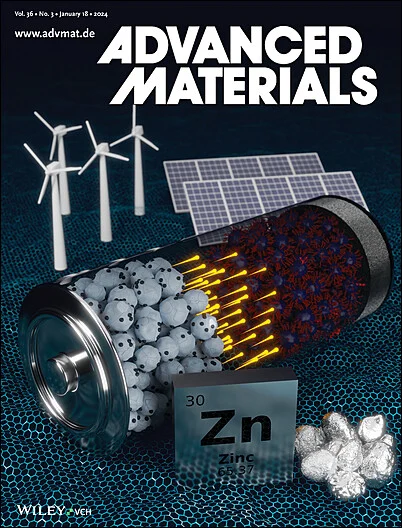一种用于1-/2-溴代烷烃选择性异构体吸附、控制释放和开启比色传感的继电器型固态大环主-客体系统。
IF 27.4
1区 材料科学
Q1 CHEMISTRY, MULTIDISCIPLINARY
引用次数: 0
摘要
基于大环的自适应晶体因其精确的吸附和分离能力而受到广泛关注。然而,在非热刺激下实现受控分析物释放仍然是主要挑战。本文提出了一种基于氟化柱芳烃衍生物EtFLP6的继电器型固态主客体系统,该系统能够选择性吸附1-/2-溴烷烃异构体、室温控制解吸和开启比色传感。活化的EtFLP6晶体选择性地从1-/2位异构体混合物中吸附1-溴代烷,并在室温下引入缺电子芳香受体(4-硝基苯腈和1,5-二氟-2,4-二硝基苯)释放它们,引发从无色到橙色的明显颜色变化。结合x射线粉末衍射和光谱分析的单晶结构表明,解吸和颜色变化是由与受体的竞争结合驱动的固态主客体配合物的分解引起的。这一过程受固态EtFLP6分子间动态相互作用和选择性分子识别的支配。本研究将传统的大环吸附剂与功能性有机共晶连接起来,为设计智能超分子材料提供了一种新的策略。本文章由计算机程序翻译,如有差异,请以英文原文为准。
A Relay-Type Solid-State Macrocyclic Host-Guest System for Selective Isomer Adsorption, Controlled Release, and Turn-On Colorimetric Sensing of 1-/2-Bromoalkanes.
Macrocycle-based adaptive crystals have gained significant attention for their precise adsorption and separation capabilities. However, achieving controlled analyte release under nonthermal stimuli remains a major challenge. Here, a relay-type solid-state host-guest system based on a fluorinated pillararene derivative, EtFLP6, is presented, which enables selective adsorption of 1-/2-bromoalkane isomers, room-temperature-controlled desorption, and turn-on colorimetric sensing. Activated EtFLP6 crystals selectively adsorb 1-bromoalkanes from mixtures of 1-/2-positional isomers and release them at room temperature upon introduction of electron-deficient aromatic acceptors (4-nitrobenzonitrile and 1,5-difluoro-2,4-dinitrobenzene), triggering a distinct color change from colorless to orange. Single-crystal structures incorporating X-ray powder diffraction and spectral analyses reveal that the desorption and color change result from the disassembly of solid-state host-guest complexes, driven by competitive binding with acceptors. This process is governed by the dynamic intermolecular interactions and selective molecular recognition of EtFLP6 in the solid state. This work bridges traditional macrocyclic adsorbents with functional organic cocrystals, offering a novel strategy for designing intelligent supramolecular materials.
求助全文
通过发布文献求助,成功后即可免费获取论文全文。
去求助
来源期刊

Advanced Materials
工程技术-材料科学:综合
CiteScore
43.00
自引率
4.10%
发文量
2182
审稿时长
2 months
期刊介绍:
Advanced Materials, one of the world's most prestigious journals and the foundation of the Advanced portfolio, is the home of choice for best-in-class materials science for more than 30 years. Following this fast-growing and interdisciplinary field, we are considering and publishing the most important discoveries on any and all materials from materials scientists, chemists, physicists, engineers as well as health and life scientists and bringing you the latest results and trends in modern materials-related research every week.
 求助内容:
求助内容: 应助结果提醒方式:
应助结果提醒方式:


